The RSF Downward Spiral
Technorati tags: Press Freedom, RSF, World Press Freedom Index 2007, Malaysia
By now, the bloggerhood should be well aware that Malaysia has dropped 32 spots in the Reporters Sans Frontières (or Reporters Without Borders - better known as RSF) Worldwide Press Freedom Index 2007. Among others, esteemed blogger mates Howsy, Jeff and Rocky (in order of posting) had quite diligently reported on this yesterday. As pointed out, this is the very lowest Malaysia has been ranked in the study, the sixth since its inception in 2002.
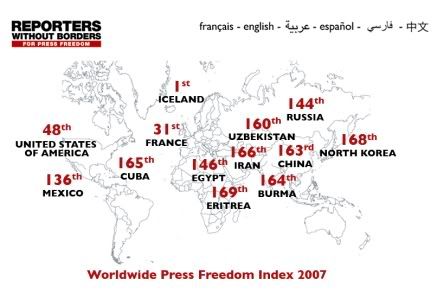 Just released: the 2007 RSF World Press Freedom Index
Just released: the 2007 RSF World Press Freedom Index
Instead of rehashing what's already been reported, what Walski decided to do instead was to tabulate and chart the rankings trend of a few select countries, Malaysia included, using data obtained from the RSF reports for the past 5 years (2007 included). He decided to omit the data from 2002, because it did not contain a ranking for Singapore, one of the countries Walski has decided to benchmark us against. (The RSF site also provides information on how the index is compiled, and the questionnaire used to gather the index)
And no, we're NOT better than Ghana. Not by a long shot. At least, not when it comes to Press Freedom. And the trend also shows that we're losing out to Indonesia in terms of freedom of the press.
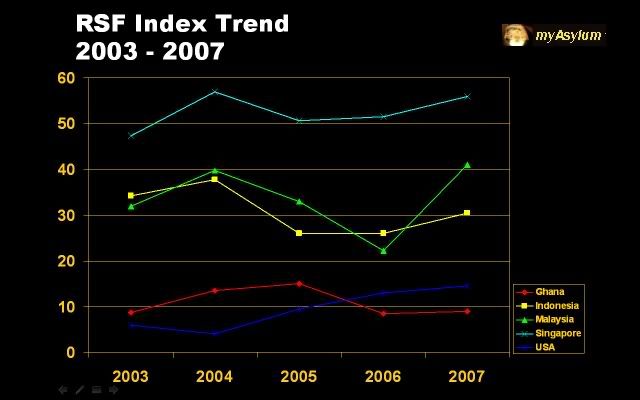 Anyone with the notion that we're better than Ghana or Indonesia... guess again
Anyone with the notion that we're better than Ghana or Indonesia... guess again
(click on chart to view larger image)
While Walski doesn't wish to rehash what the other esteemed bloggers earlier mentioned had already stated, there is one area that is very much worth repeating. It has a direct effect on our freedom to express ourselves online (emphais by myAsylum).
The Internet is occupying more and more space in the breakdown of press freedom violations. Several countries fell in the ranking this year because of serious, repeated violations of the free flow of online news and information.
In Malaysia (124th), Thailand (135th), Vietnam (162nd) and Egypt (146th), for example, bloggers were arrested and news websites were closed or made inaccessible. “We are concerned about the increase in cases of online censorship,” Reporters Without Borders said. “More and more governments have realised that the Internet can play a key role in the fight for democracy and they are establishing new methods of censoring it. The governments of repressive countries are now targeting bloggers and online journalists as forcefully as journalists in the traditional media.”
(source: RSF - download the full release and index here)
A couple of notes about the chart above (and the country-specific ones in the full post). First, Walski decided to chart the trends using the index values, as opposed to ranking. These values have been derived from the criteria RSF has chosen to benchmark countries worldwide, and therefore gives a better indication of where a country stands year on year. Using the rankings alone can be a bit misleading, as the total number of countries surveyed changes from year to year - 139 in 2002 vs. 169 this year, with some changes in between. Second point - the higher the index, the lower a country's ranking is (but you smart cookies probably knew that already).
At a glance, though, it does appear that worldwide, compared to 2006, freedom of the press has suffered somewhat, basing on the index values. The general upward index shift from 2006 to 2007 says it all.
(index observations, and more, in the full post)
From the press release excerpt (download the full release here), the main reason why Malaysia plunged 32 spots is obviously the arrest of Nat Tan earlier this year, and the harassment of Raja Petra Raja Kamaruddin (and wife), over alleged seditious postings on their respective sites.
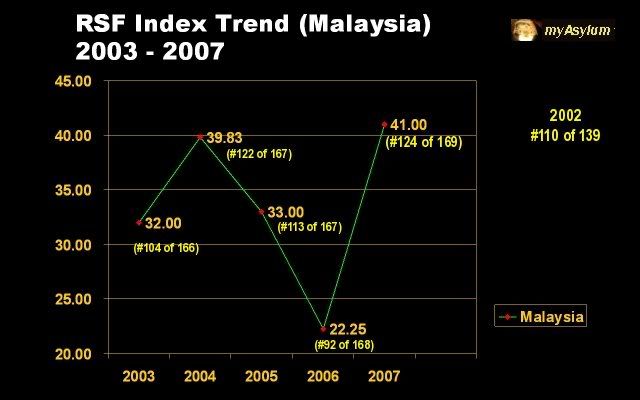 Click on chart to view a larger image
Click on chart to view a larger image
What also doesn't help, in all likelihood, is the threatening rhetoric we hear frequently from our Cabinet ministers, vis-a-vis the press. ZAM for one, does us no favors in as far as the RSF index goes. But the question is why the sudden shift for Malaysia?
Walski can think of a few other factors, actually. For one thing, it's a sign of maturity within the Cabinet. Maturity, not in a good sense, but in how the idiocy of our ministers have really shone in the past year. That, and the inability to come to grips with the changing landscape of information flow. The old-school of information and control, still by and large practiced by our Government, is rendered ineffective due to the pervasiveness of the Internet.
Moore's Law - describing how density of computing electronics increases exponentially over time - is probably also applicable to the growth of blogging. Anyone who's attempted to keep track of how many Malaysia-related weblogs there are would have noticed this. And with blogs, everyone has a voice that can be heard, without the incumberance of the stringent media licensiing practiced in Malaysia. And this, perhaps is another factor why we've seen a sudden panic attack from within the incumbent political fraternity.
Another possible factor - the who-knows-when General Elections. And although no one exactly knows when (save the secret chambers of the BN elders), what is known is that it will be soon. Couple that with the perceived increase in governmental ineptitude, a clampdown on the media is definitely not unexpected. Everyone, and their pet rabit, knows that the mainstream media is controlled by entities friendly to the BN-led government - but enter citizen journalism (via blogging) and web-based information and news services - kinda throws a big spanner into the info control works, if you ask Walski. The propaganda machine, therefore, finds itself unable to be effectively serviced, unlike before.
Anyhow, that's what Walski thinks of the why's... he's sure you lot can think of a few more reasons. If you can, drop a comment or three, won't ya?
Another interesting thing Walski noticed while charting the indexes over the last five years - you can pretty much group countries with equivalent media freedoms, based on what their index values are. Time, unfortunately, doesn't permit Walski to chart it for all the 169 countries. But what we'd see is that Malaysia and Indonesia, for example, fall within the same Media Freedom band. Similarly, Ghana and the United States of America.
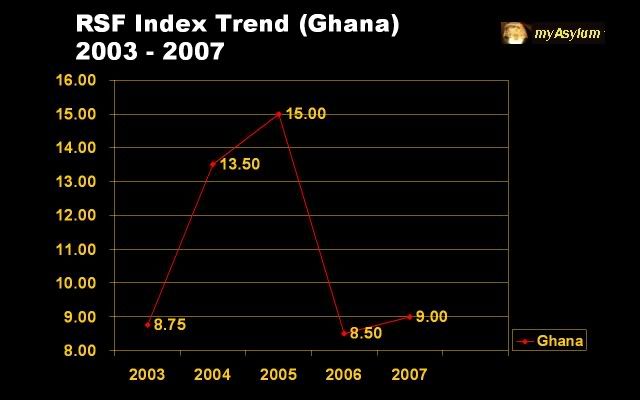 Click on chart to view a larger image
Click on chart to view a larger image
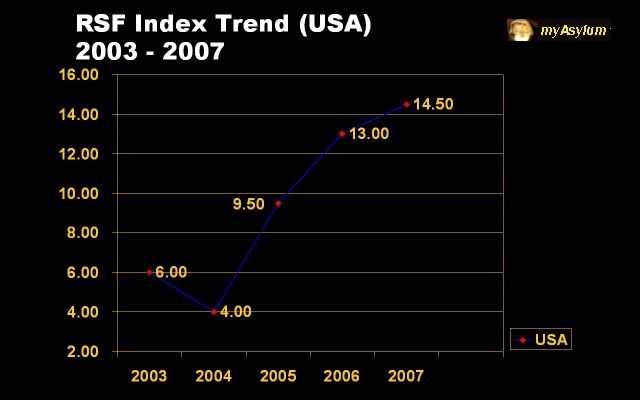 Click on chart to view a larger image
Click on chart to view a larger image
Contrary to popular perception, the level of press freedom in the US of A, has actually deteriorated progressively over the last 3 years. Coincidentally, the steady slide has been during each successive year of the second George W. Bush administration (i.e since 2004) - but the reason provided by RSF is the continued incarceration of "Al-Jazeera’s Sudanese cameraman, Sami Al-Haj, since 13 June 2002 at the military base of Guantanamo and the murder of Chauncey Bailey in Oakland in August " (of this year). Then again, the inherrent rights of free speech and press in the US is the reason why their index stands at 14.5 versus ours (at 41).
Singapore, from Walski's chart, is in a league of its own - which is no big surprise.
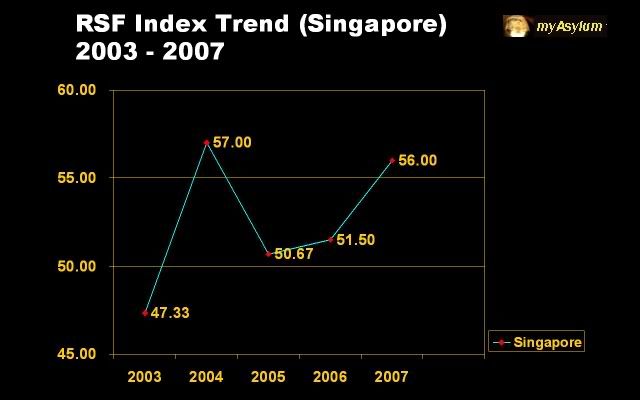 Click on chart to view a larger image
Click on chart to view a larger image
Comparing to Indonesia, however, it is clear that the press there is freer. In many other ways, too, Indonesia is a more liberal country comparatively. Which is probably one reason why Beyonce decided to skip Malaysia.
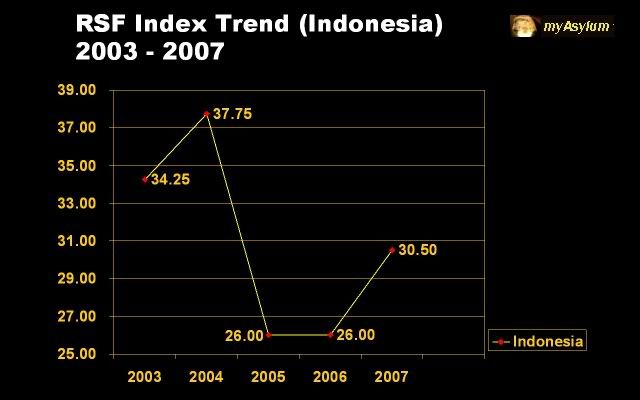 Click on chart to view a larger image
Click on chart to view a larger image
A 4-point slip in the index for Indonesia is probably consistent with the general trend worldwide, as Walski mentioned earlier. A slip of 18.75 points, in Malaysia's case, on the other hand, shows that press freedom in Malaysia has definitely suffered since 2006.
And looking at the trend, if things stay on the same course, Indonesia can be expected to have a more conducive environment for free flow of information. Sure, they have their problems, too. But at least they have a bigger leaway to voice out their grouses, with less of a threat of being silenced, in comparison.
Of course, the media controllers on the 4th floor (as reported by Rocky), can claim that the press has never been freer in Malaysia. They did not, in all likelihood, include web-based citizen reporting and Internet-based independent media, in their spin. But there are factors, other than the ability to report freely, that go into the index - like the consequences of reporting freely.
And as the experiences of Nat and Raja Petra have shown, the consequences can sometimes be dire. Or at the very least, unpleasant.
















